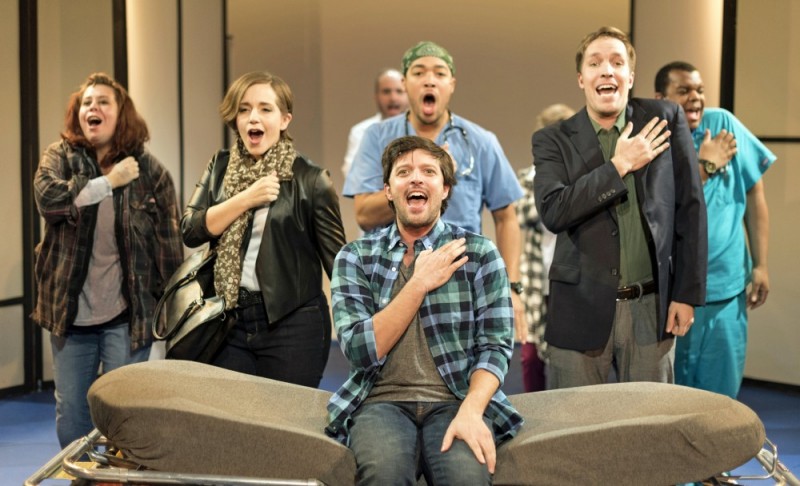
A New Brain. Music and lyrics by William Finn, Matthew Decker directed at Theatre Horizon, Norristown PA.
A New Brain is a musical about the life-threatening illness of the composer and lyricist William Finn. Rather than being clinical, the show has humor and inspiration. Matthew Decker’s new production brings out the wackiness of Finn’s imagination, and the cast is exceptional.
In June of 1992, one week after Finn received Tony Awards for writing the words and music to Falsettos, he collapsed from what seemed to be either a stroke or an aneurysm. It turned out that the 40-year-old Finn had a malformed artery in his brain, leaking and ready to burst. He lay in a coma with his mother, lover, and friends at bedside and he underwent high-risk surgery on his brain.
As Finn regained consciousness, he began writing songs about his experience. This evolved into a humorous exploration of crisis and recovery, which was produced at Lincoln Center in 1998. Finn wrote all the words, while James Lapine suggested shaping and is credited as co-author.
A New Brain sticks closely to what really happened and accurately captures the personalties of his family and friends. Finn’s alter-ego in the play is named Gordon Schwinn, an anxious neurotic, quite faithful to Finn whose friends have described as “Mister Negativity.”
The show reveals the songwriter’s biggest terror about possible death: the fear that he’ll never be able to finish the music that’s inside him.
A New Brain touches universal themes. Every self-doubting man or woman who wonders whether he or she will ever achieve anything will identify with this. Gordon is plagued by an additional fear: not just that he will die, but that if he lives, his brain will have been altered and he won’t be the same man he was before.
Schwinn regrets all the songs he never wrote, the stories he never found time to tell. He, like us, wonders what part of him — or what creation of his — might live on after death.
The script reminds director Decker of his mother who died last year, prematurely. For me, it recalls the surgery I underwent when I was 35, when physicians feared I had cancer and I prayed just to remain alive long enough to see my young children grow to adulthood.
Decker’s direction is even better than that of Gracielle Daniele at Lincoln Center and of James Lapine for Encores in New York last season. Every move and glance is impelled by Finn’s words, yet translated imaginatively. The show has surrealistic scenes as the semi-conscious songwriter hallucinates. Especially clever is Decker’s handling of Schwinn’s experience of going through an MRI, which he likens to sailing in a becalmed boat off the coast of New England.
His handling of the song “And We’re Off,” about Schwinn’s father who left his family because of his obsession with horse racing, is riveting, and so is his staging of scenes with Schwinn’s hated employer, the host of a children’s TV show who is a negative voice inside the songwriter’s mind.
The Horizon cast compares favorably with the original Lincoln Center cast that included Malcolm Gets, Kristin Chenoweth, Norm Lewis, Chip Zien and Mary Testa. Steve Pasek was exceptional as Schwinn, onstage through virtually all of the 90-minute show, acting powerfully, singing sweetly and also dancing and playing piano. The superb ten-member ensemble included Rachel Camp as Schwinn’s pal Rhoda and Susan Riley Stevens as the songwriter’s mother who dealt with her son’s expected death in an unusual way. Both of these women, in real life, behaved just as they do in the show. The rest of the fine ensemble included Rob Tucker, Mina Kawahara, Melissa Joy Hart, Doug Hara, Peter Carrier, Larry Lees and Christian Eason.
Amanda Morton deserves immense credit for supervising the tricky music which was beautifully orchestrated by Michael Starobin, and Jenn Rose devised the inventive choreography.
Three of A New Brain’s ballads are extraordinarily beautiful: “I Have So Many Songs,” “I’d Rather Be Sailing (and then come home to you)” and “The Music Still Plays On,” a mature woman’s reflection about how life continues after a series of losses. Near the start of the play, the protagonist sings the finger-snapping “You’ve got to have heart and music to make a song.” At the end he thankfully sings, to that same melody, that he’s been given “time and music.”